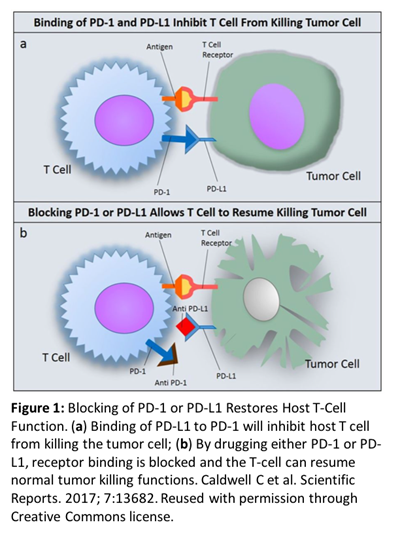Evaluating immune checkpoint inhibition biomarkers
Immune checkpoint inhibition, particularly with drugs targeting the PD-1/PD-L1 pathway, has emerged as the most widely used immunotherapy strategy in cancer treatment. A number of anti-PD-1/PD-L1 therapies are available for different cancer indications.
This resource aims to provide an overview of the benefits and limitations of commonly used immune checkpoint inhibition biomarkers.
Biomarkers
To identify candidates for immunotherapy, an increasing number of biomarkers may be useful for clinicians and patients, including PD-L1, microsatellite instability, mismatch repair deficiency, and tumor mutation burden (Table 1).
While these biomarkers can help identify patients who may benefit from immunotherapy, it is important to remember they are surrogate indicators of response to immunotherapy. They are not 100% predictive of a favorable response to any single agent, or immunotherapies in general.
- Patients with positive biomarkers may not respond to immunotherapy
- Patients with negative biomarkers may still respond on immunotherapy
Not all laboratories include these biomarkers on therapeutic genomic panels; they may be available as additional tests if requested.
Table 1: Common immunotherapy biomarkers
|
Biomarker |
How it is measured |
How it works |
|
Tumor mutation burden (TMB) |
Measurement of the number of mutations in the tumor. |
Some mutations in cancer cells result in modified cell surface proteins, called neoantigens. Neoantigens are thought to be targeted by the immune system to produce an antitumor response. High TMB results in increased neoantigens on the cell surface, which as some experts believe, makes it more likely that the immune system will differentiate the cancer cell from noncancer cells. |
|
Microsatellite Instability (MSI) |
MSI testing identifies if the tumor has an abnormal number of DNA microsatellites. |
MSI-high tumors have a defective DNA repair mechanism, creating more genomic instability, which may make them more susceptible to immunotherapy. |
|
Mismatch repair deficiency (dMMR) |
Immunohistochemistry assessment MMR proteins. |
Tumors with MMR have compromised cellular DNA repair abilities and may be more susceptible to immunotherapy. |
|
PD-L1 |
Immunohistochemistry assessment of the cell surface protein ligand PD-L1, which is expressed on certain cancer cells. |
PD-L1 binds with PD-1, a cell surface protein expressed on activated T cells that acts as a checkpoint inhibitor. (Figure 1) Cancer cells positive for PD-L1 may respond to immunotherapy, specifically treatment with PD-L1/PD-1 inhibitors. |
FDA guidance
- PD-L1, TMB, MSI and dMMR are included in indications and usage criteria on FDA labels and have thus been validated in large clinical studies.
- PD-L1 assessment must be done through an FDA-approved test.
Indications for PD-L1 testing
Determining whether or not PD-L1 testing is indicated can be complicated. Currently, there are six anti-PD-L1/PD-1 drugs available for clinical use:
- Pembrolizumab, Nivolumab, Atezolizumab and Cemiplimab require PD-L1 testing through an FDA-approved test for for some indications, but for others they can be prescribed independently of PD-L1 status (Table 2).
- Durvalumab and Avelumab can currently be prescribed independently of PD-L1 status.
Table 2: Indications for anti-PD-1/PD-L1 immunotherapy
|
PD-L1 testing required |
|
|
In general, the following cancers may require PD-L1 testing for “on-label” use of pembrolizumab, nivolumab or atezolizumab: |
|
|
|
|
PD-L1 testing not required |
|
|
In the appropriate clinical context, anti-PD-L1/PD-1 drugs may be considered for the following cancers irrespective of PD-L1 testing: |
|
|
|
See NCCN guidelines and drug package inserts for more information. Additional anti-PD-L1/PD-L1 drugs are in various phases of clinical and pre-clinical development, so the list of available therapies as well as indications may grow.
Learn more
ESMO Factsheets on Biomarkers (Oncology Pro). Factsheets about common biomarkers that discuss prognostic and predictive value, testing recommendations, and patient indications.
Biomarkers for Checkpoint Inhibition (2017 ASCO Educational Book). An overview of currently available and emerging biomarkers.
References
Astrazeneca UK LTD. Imfinzi®(durvalumab) highlights of prescribing information. Updated 6/2020. Accessed 8/6/2020.
Bristol Myers Squibb. Opdivo® (nivolumab) highlights of prescribing information. Updated 1/2021. Accessed 3/31/2021.
Caldwell C, Johnson CE, Balaji VN et al. Identification and validation of a PD-L1 binding peptide for determination of PDL1 expression in tumors. Scientific Reports. 2017; 7:13682. Reused with permission through Creative Commons license.
EMD Serono Inc. Bavencio®(avelumab) highlights of prescribing information. Updated 6/2020. Accessed 8/6/2020.
Genentech Inc. Tecentriq®(atezolizumab) highlights of prescribing information. Updated 10/2020. Accessed 10/15/2020.
Mathew M, Safyan RA, and Shu CA. PD-L1 as a biomarker in NSCLC: challenges and future directions. 2017. Ann Transl Med; 5:375.
Merck Sharp Dohme. Keytruda®(pembrolizumab) highlights of prescribing information. Updated 3/2021. Accessed 3/31/2021.
National Comprehensive Cancer Network. NCCN Clinical Practice Guidelines in Oncology: Non-small cell lung cancer, version 6.2018. 2018. www.nccn.org.
Regeneron Pharmaceuticals. Libtayo®(cemiplimab) highlights of prescribing information. Updated 2/2021. Accessed 3/31/2021.
Sunshine J and Taube JM. PD-1/PD-L1 inhibitors. Curr Opin Pharmacol. 2015; 23:32-8.
Tray N, Weber JS, and Adams S. Predictive Biomarkers for Checkpoint Immunotherapy: Current Status and Challenges for Clinical Application. Cancer Immunol Res. 2018; 6(1):1122-1128.
Topalian S. Targeting Immune Checkpoints in Cancer Therapy. JAMA. 2017; 381(17):1647-1648.
Walk EE, Yohe SL, Beckman A, et al. The Cancer Immunotherapy Biomarker Testing Landscape. Arch Pathol Lab Med. 2020; 144(6), 706–724.
About
This resource was developed as part of the Maine Cancer Genomics Initiative (MCGI) and is supported by The Harold Alfond Foundation and The Jackson Laboratory.
Updated April 2021

